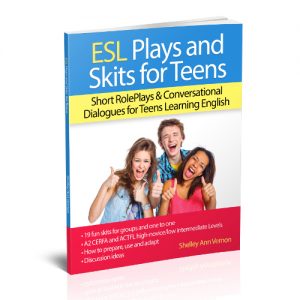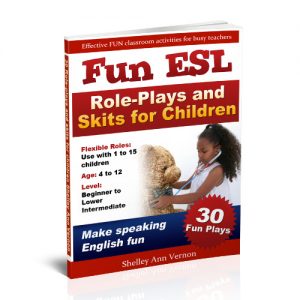Developing speaking skills can be tricky because one or two dominant pupils usually do all the talking. Bright students butt in and answer everything while shy ones sit there silently. In addition, young teens might be apathetic about learning English. Consequently, they say very little and, if they do, they give short answers. As a result, the usual method of taking in an article to read and discuss can make for a pretty dull class.
Motivation to speak
1. Firstly, structure the activities so that students do the work; they make the lesson, not you. For example, use their ideas for the class, not a reading passage from the coursebook or an article.
2. Turn a debate into a game. Make teams and brainstorm a topic, having them work to earn points for every comment they make, however silly.
3. Students have a 30-second talking challenge to earn points for their team but, another team picks the subject. To play, teams write topics on slips of paper. Students pass these around until you say stop. Now, everyone has one minute to prepare for the subject on the slip they just received. Then, students take turns to do their 30-second speech to earn a point for the team. If a player does not know anything about their topic, they use their imagination and make something up.
For example, let’s say ‘Oslo’ is the subject. However, it may be that the student with this topic knows nothing of Norway or that Oslo is its capital city. No worries! Oslo can be a dog’s name; a dog that lives in a house with a big garden, that loves walks, etc. Moreover, topics for middle school should match students’ level of English. Things like my house, garden, sister, last weekend, next weekend, our pet, friend, and school would be appropriate.
A variant is to have teams of 3 or 4 prepare as a group for a minute. Then, each team gives its talk as a group. Any team member can say something, just as long as someone is talking all the time. More than five seconds of silence, and the team is eliminated!
Keep the atmosphere light.
Other tips
- Having silly points keeps the atmosphere light. You want light conversation rather than passionate divisive debate. You want students to feel that participating in English discussions is a light-hearted learning tool, not a soul-baring activity reserved for the courageous.
- Try different things; the students will get used to being creative and get better at it.
- They should debate things that they enjoy.
- The key is to have students choose topics themselves. Whatever you pick, it won’t be cool!
- Keep it light-hearted. I wouldn’t debate anything heavy.

Avoid contentious topics – keep it light!
Structured activities for speaking skills
1. Topics
At 11-12, kids may not be very skilled at arguing a point, so give them more structure. For example:
- What is the best pet you could have? Cats, dogs, horses, other
- Make four teams – those that think cats are the best are in the same team, and so on.
- Each cat-team pupil gives one reason why cats are the best. For each different reason, that team earns a point.
- Then the dog fans have a go, and you note the points on the board.
- Then the horse fans.
- And the “other” team. In that team, each pupil gives one reason why their choice of pet is the best.
2. Debate cards
You can create debate cards and put kids in pairs or small groups to give them ideas or roles to play. However, it would be better if students created their own debate cards. Working in groups saves the ones who have no ideas from being stuck! Prepare an example for demonstration. For example:
Mum: I don’t want you to go to boarding school. I’ll miss you. I won’t be able to keep an eye on you. It’s expensive; you’ll be tired all the time; you might not like the food. I like cooking for you and looking after you.
Child: I want to go to boarding school because I won’t have to travel each day to and from school, I will be with my friends, study periods are supervised, there are team sports at the weekends, there are trips, it’s fun, and I’ll be home in the holidays. And, you won’t have to cook for me in the week, you can do some sport instead of looking after me; I won’t mess up the house all the time because I won’t be there!
Have some kids come up front and demonstrate your example of the “debate” using the cards. Then have the kids write their arguments for topics they have chosen. Next, kids perform their debates in class. Finally, collect their statements and a different lesson, let pupils “debate” again with the cards or opinions made by other classmates, adding their ideas.
Optional
- To win their point, pupils have to use debating terms or a specific phrase at least once.
- You could give bonus points for accuracy; however, that might be laborious.
Check out this blog post below for more speaking skills ideas for teens: https://www.teachingenglishgames.com/new-ideas-plays-skits-or-theatre-teens
We welcome any ideas you have in the comments box!
All the best, Shelley Ann Vernon.
Great Speaking Skills Resources
PS Try my skits for kids or teen skits to get your students speaking.
-
Sale Product on sale
 Plays and Skits for Teens
Plays and Skits for Teens€19.97Original price was: €19.97.€15.33Current price is: €15.33.Rated 5.00 out of 5 based on 1 customer rating -
Sale Product on sale
 Fun ESL Role-plays and Skits for Children
Fun ESL Role-plays and Skits for Children€19.97Original price was: €19.97.€15.33Current price is: €15.33.


